Knock, Knock,The Door Of All Doors Has Been Open, Here Comes The Pain, Panic In DC – Ep. 2863
Podcast: Download (Duration: 1:20:23 — 34.9MB)
Watch The X22 Report On Video
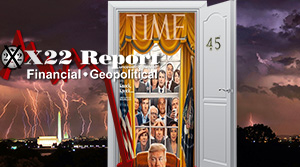
The people around the world are rising up, the leaders are panicking, they are blaming the anger on climate change, but the people are angry and the criminal leaders. The [CB]/[WEF] agenda is falling apart, the green push has hit a wall, the people see this very clearly, [CB] panicking. The [DS] is working out of fear and panic, they know they have nothing on Trump but they push to indict Trump, this charge will not stick, they do not have any evidence, so what is the motive, to manipulate the midterms and to create chaos using riots. This agenda will fail, it is a trap the patriots are ready. The [DS] treasonous crimes will destroy them, the documents that Trump declassified will be used against them in the court of law. The people must see the Truth. Trump calls on Durham to move forward.
Economy
The Real Toria Brooke@therealtoriabrooke
- BELGIUM — Belgian farmers blockaded the town center of Hoogstraten and tried to invade the Town Hall to protest against a nitrogen plan by the government which could lead to many farm closures.
- Several of the posts were from small business owners who getting absolutely crushed right now, and won’t be able to remain operational much longer.
- One such owner is Geraldine Dolan, who owns the Poppyfields cafe in Athlone, Ireland – and was charged nearly €10,000 (US$10,021) for just over two months of energy usage.
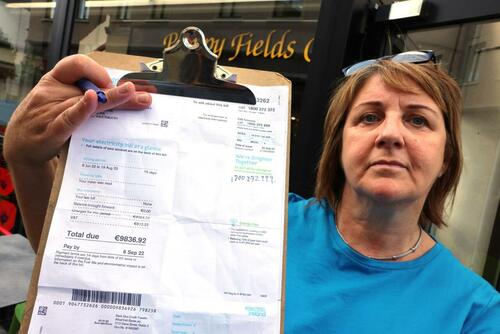
- As the Irish Times reports, “The cost of electricity to the Poppyfields cafe for 73 days from early June until the end of August came in at €9,024.70 an increase of 250 per cent in just 12 months. There doesn’t include the €812.22 in VAT, which brought her total bill to €9,836.92.”
- “How in the name of God is this possible,” tweeted Dolan.
UK pensioners are also facing a “terrifying” winter, as elderly Britons are about to get hit with an 80% rise in energy bills in October.
Twitter researcher ‘Crab Man’ (@crabcrawler1), who compiles deep dives on a wide variety of topics (and is absolutely worth a follow), has put together a lengthy thread of similar cases – and put it in the context of the current European energy backdrop. The situation is dire, to say the least.
Source: zerohedge.com
DEVELOPING: California power grid officials warn of blackouts, urge residents to conserve energy.
“Set thermostats to 78 degrees or higher, avoid using large appliances and charging electric vehicles, and turn off unnecessary lights,” pic.twitter.com/hOn8kweyuD
— Breaking911 (@Breaking911) August 31, 2022
- Just days after passing a law banning new sales of gasoline powered cars by 2035, California is urging residents to avoid charging their electric vehicles during peak hours in the coming week to help ward off blackouts during an expected heatwave.
- .
- The top three conservation actions are to set thermostats to 78 degrees or higher, avoid using large appliances and charging electric vehicles, and turn off unnecessary lights.“
- Excerpt from the San Diego Union-Tribune) on the warning:
The California Independent System Operator that manages the electric grid for about 80 percent of the Golden State warns the power system is expected to come under strain as homeowners and businesses crank up their air conditioning units. Weather forecasters expect temperatures to climb on Wednesday and intensify through the start of next week.
Source: thegatewaypundit.com
Political/Rights
Wow! Joe Biden Speaks in Pennsylvania, Can’t Even Fill High School Gym (VIDEO)
- 81 million votes!
- Do you remember when President Trump won Pennsylvania by 795,000 votes in a landslide and then Democrats locked the doors on the counting rooms and manufactured a million votes in five days to steal the state?
- We do.
- Joe Biden held a rally in Wilkes-Barre, Pennsylvania.
- Joe Biden could not even fill a high school gym.

They even left part of the stands up.
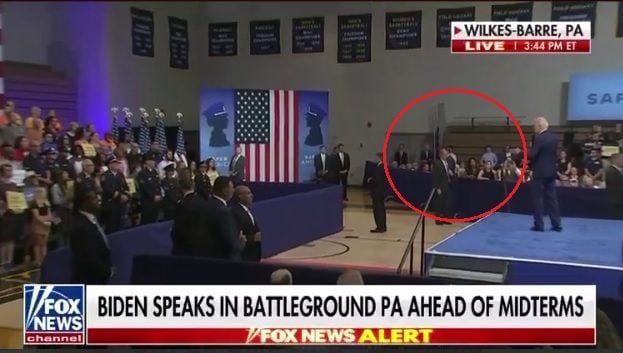
Source: thegatewaypundit.com
Turns out this didn't happen. Will ESPN issue a retraction now that you've brought their network into it? https://t.co/t5WP2PPjWP
— Stephen L. Miller (@redsteeze) August 31, 2022
Source: thegatewaypundit.com
- When Paul Sperry speaks, I listen! As hard as this is to believe, with this group of sickos, led by Strzok and McCabe, I wouldn’t put it past them. Hopefully John Durham can move quickly on this, and everything else. They spied on my Campaign, lied to the FISA Court, and did so much else that was really bad, evil, unlawful, and unconstitutional—the public is waiting “with bated breath” for the Durham Report, which should reveal corruption at a level never seen before in our Country…
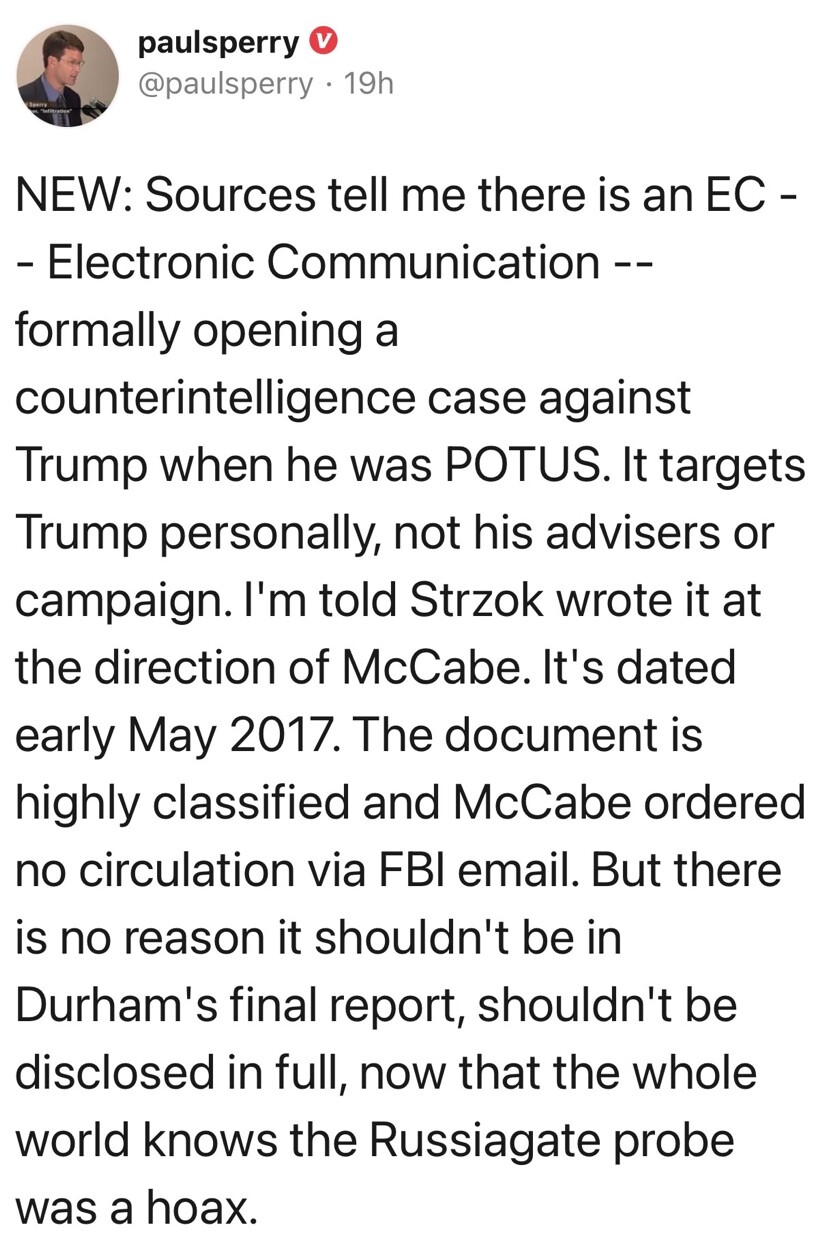
- The Justice Department’s former second-in-command who released the text messages of former FBI employees concerned about a Donald Trump presidency will face questions from at least one of those employees in a deposition.
- Rod Rosenstein, who was Deputy Attorney General from April 2017 to May 2019, has a deposition scheduled for Sept. 15 in the case against the Attorney General’s office, the Justice Department, and the FBI by former agent Peter Strzok. The ex-Deputy Attorney General served as the No. 2 for both Jeff Sessions and Bill Barr.
- Two lawsuits against federal law enforcement officials and agencies by Strzok and former FBI lawyer Lisa Page stem from the December 2017 release of text messages between the two in which they exchanged concerns about a possible Trump presidency. The messages also revealed that Strzok and Page were having an extramarital affair. The disclosure of the texts animated conservatives and Trump supporters, who claimed that the messages proved the existence of a so-called “Deep State” that was working to undermine the then-president, even before he took office.
Source: lawandcrime.com
Geopolitical/Police State
New York City will begin posting signs proclaiming Times Square a “Gun Free Zone.”
It will be one of scores of “sensitive” places that would be off limits for guns under a new state law meant to address a Supreme Court decision expanding gun rights. https://t.co/Pa9h8qBdvd
— The Associated Press (@AP) August 30, 2022
- Biden was speaking in Wilkes-Barre while promoting gun control and bolstering police forces across the nation. Biden pushed for a federal ban on so-called “assault weapons” and took aim at Republicans during his speech, invoking the late Supreme Court Justice Antonin Scalia.
- resident Joe Biden said while in Pennsylvania that “brave right wing Americans” who claim the Second Amendment is meant to fight back against a tyrannical government would be obliterated by the military.
- “
.@JoeBiden mocks patriots who correctly state the Second Amendment was written to allow the PEOPLE to defend the nation from a tyrannical government.
"If you want to fight against the country, you need an F-15. You need something little more than a gun." pic.twitter.com/flEkea4nAC
— Young Americans for Liberty (@YALiberty) August 30, 2022
Source: dailycaller.com
Babbling dementia-addled tyrant says what?
Wait…are you threatening us?
You better think twice
'cuz you just lost a war to a bunch of 7th century sandal-wearing savages & all they had was AKshttps://t.co/D8LP70agqN— Jim Hanson (@JimHansonDC) August 31, 2022
War
Biden and Iran Reportedly Agree to Continue Talks and Allow Iran to Sell Its Oil in Global Markets
- The Biden/Obama gang’s answer to high gas prices is to allow Iran to sell its oil freely around the world.
- With gas prices at record highs recently in the US due to the Biden/Obama gang’s efforts to shut down drilling in the US, the White House has figured out an answer. They will allow the terrorist nation of Iran to sell their oil on world markets.
- You can’t make this stuff up.
Source: thegatewaypundit.com
False Flags
UC Berkeley to Require Masks… Again… But You Won’t Believe Why…
- The Orwellian leadership at UC Berkeley are leading the charge with their new “Mask Guidance“. I
 Now, apparently, the UC Berkeley “Big Brothers” will demand you wear a mask for the flu if you are not vaccinated against it. Once again: Mandela Effect. If these institutions of indoctrination have their way, a generation to come will reminisce on the past and won’t remember a flu season when we didn’t wear masks.
Now, apparently, the UC Berkeley “Big Brothers” will demand you wear a mask for the flu if you are not vaccinated against it. Once again: Mandela Effect. If these institutions of indoctrination have their way, a generation to come will reminisce on the past and won’t remember a flu season when we didn’t wear masks.- But the biggest question from this policy: why would require masks during flu season if you’re unvaccinated but not require them for students unvaccinated from COVID-19?
- A recent study confirmed disposable face masks released dangerous levels of the carcinogen titanium dioxide (TiO2).
- The study found that the TiO2 levels exceeded the acceptable exposure level by four times or more.
- Here is the report from the NIH National Library of Medicine:
Although titanium dioxide (TiO2) is a suspected human carcinogen when inhaled, fiber-grade TiO2 (nano)particles were demonstrated in synthetic textile fibers of face masks intended for the general public.
- Florida Gov. Ron DeSantis’ administration has filed a lawsuit alleging that the U.S. Food and Drug Administration has not complied with a public-records request that would shed light on why the FDA has not yet approved the state’s proposed program to import cheaper prescription drugs from Canada.
- “630 days, you know, we still sit here waiting for an answer,” DeSantis said at a press conference. “And so it’s our view that we’ve waited long enough. And so today we’re taking action. The state of Florida has now filed a lawsuit against the FDA. They have unlawfully withheld and unreasonably delayed approval of Florida’s program. And we think this violates federal law. So we’re asking a federal judge to order the FDA to put an end to that delay and to approve Florida’s [plan].”
Source: beckernews.com
- I wonder how short Joe Biden and the Democrats’ memory span really is, considering they literally did this in various cities across the country?

Q
I’m shocked, I tell you. Release of J6 report, originally set for September 13, pushed back until October 18.
Just in time for the midterms! pic.twitter.com/ljXrWUfrFe
— Julie Kelly 🇺🇸 (@julie_kelly2) August 31, 2022
- Congratulations to the many FBI & DOJ Whistleblowers who have flooded the offices of our Senators & Congressmen/women with really bad things to say about what is going on. This is the time, after many years of lawbreaking & unfairness, to clean things up. All things for a reason. DRAIN THE SWAMP!!!
All Things for a reason
3432
8chan/qresearch: 7040112
- According to attorney Mike Davis, Biden’s Attorney General Merrick Garland just ordered that no members of the DOJ can contact Congress. That’s against the law.
If Garland’s memo is interpreted as ordering DOJ employees not to go to Congress with information on crimes taking place within the DOJ, then Garland broke the law.
If true, that would violate 5 U.S.C. §7211 (the Lloyd-La Follette Act).https://t.co/sc5VgdhJ3X
— Jason Foster (@JsnFostr) August 30, 2022
3/3. And, here's the nonpartisan GAO opinion that is cited in the letter above, explaining the history and purpose of these laws—to ensure Congress has the info needed to perform its Constitutional functions.https://t.co/DLHhCelqn8 pic.twitter.com/yU99IVFam3
— Jason Foster (@JsnFostr) August 30, 2022
Source: thegatewaypundit.com
Merrick Garland is trying to intimidate into silence the many whistleblowers who are detailing corruption and bias at DOJ. https://t.co/RfsNKgfVJS
— Mollie (@MZHemingway) August 30, 2022
DOJ and FBI officials:
Don’t let Attorney General Garland chill your rights as whistleblowers. You have the right to speak to Congress without interference.
— Rep. Jim Jordan (@Jim_Jordan) August 31, 2022
- It has just been reported that Attorney General Merrick Garland has sent a notice to everyone at the Justice Department ordering that no one contact Congress—meaning, I assume, no Whistleblowers allowed! The only reason for this must be that with the firing of the “Special Agent” In Charge at the FBI, many within are calling political Representatives in disgust at what has happened to Law Enforcement Agencies in the United States of America. Is this interference with the Whistleblower laws?
- Thibault left the agency on Friday – exactly one month after Senator Grassley outed him for his pattern of public partisanship and anti-Trump social media posts.
- Thibault was the Assistant Special Agent in Charge (“ASAC”) of the Washington Field Office.
- Word broke on Monday that Thibault was escorted from the FBI on Friday.
- Thibault was also accused of being involved in the Mar-a-Lago raid, the Hunter Biden computer scandal, and of padding the numbers on domestic terrorism in the US.
- On Tuesday, Thibault’s attorneys released a statement on their client and his career — they basically deny EVERYTHING!

-2-

-3-

Source: thegatewaypundit.com
- So now the con man Special Agent of the FBI has announced, right after getting caught RIGGING the 2020 Presidential Election (and many other things!), and getting blasted by his “bosses,” that it would be a wonderful time for him to “retire.” What damage he has done to our nation. Look at us, we have become strictly Third World!
- People that “retire” from the FBI aren’t perp walked out of the Headquarters Building on a hot, sunny afternoon in August, after being screamed at and ridiculed by his bosses. Like the Laptop, this was the FIRING FROM HELL!
I can’t believe DOJ thought this photo was a good idea. So some rando FBI agent clipped these covers on who knows what and scattered them on the floor?
But of course DOJ knew dunces like Cheney and national news media would rage over it so https://t.co/GAtRdSCjds
— Julie Kelly 🇺🇸 (@julie_kelly2) August 31, 2022
- The ‘top secret’ documents photo, labeled ‘Attachment F’ (you can guess what the ‘F’ stands for) is indisputably provocative. The TS/SCI documents are splayed dramatically across the ornate blue carpet with white cover sheets neatly layed on top of them.

- The obvious first question many people are asking about this photo: Why are ‘top secret’ documents that are arguably so sensitive to national security that a court-appointed, independent “special master” should not be privy to them, being spread out for a publicity style photo?
- So, why this photo? Why now?
- The picture is Attachment F and the textual reference on page 13 simply says ‘Certain of the documents had colored cover sheets indicating their classification status’. It is curious that the DOJ would release this particular picture. The point is to state a fact that hardly needs an optical confirmation: the possession of documents with classified cover sheets.”
- Thus arises the second question: If this is indeed a staged photo, then why the need for the box on the right-hand side? If you take a closer look, it shows a Time magazine cover that one might interpret as a veiled threat.

Let’s take a look at the actual Time magazine cover, which is from March 4, 2019.

- It’s none other than Donald Trump’s 2020 presidential challengers spying on him while he is in the Oval Office. The cover story headline is “Knock, Knock…”
- “The cover, which appeared to be placed in a gold frame, was from a March 4, 2019 edition of the publication,” the report noted. “It showed 15 of Trump’s Democratic challengers at the time — including President Joe Biden and Vice President Kamala Harris — peering into the Oval Office at a nervous-looking Trump who is seated in his chair.”
- It may also be the case that the FBI was merely using the photo to leak information to the press.
Source:beckernews.com
- Terrible the way the FBI, during the Raid of Mar-a-Lago, threw documents haphazardly all over the floor (perhaps pretending it was me that did it!), and then started taking pictures of them for the public to see. Thought they wanted them kept Secret? Lucky I Declassified!
- Whatever happened to NUCLEAR, a word that was leaked early on by the FBI/DOJ to the Fake News Media!
- The DOJ has filed a response to the motion by President Trump for the court to appoint a special master to review the seized material from the DOJ/FBI raid on Mar-a-Lago. the outside government Lawfare group has filed an amicus brief supporting the DOJ-NSD position [Amici court pdf Here]
- Essentially the position of the DOJ boils down to… They have already reviewed the material. Yes, there was attorney-client privilege material seized; but they swear the internal team segregated the legally confidential material and the DOJ investigators & prosecutors didn’t see it – double pinkie swear, yer honor.
- Additionally, in a nice lawfare maneuver, the DOJ claims President Trump never formally evoked ‘executive privilege‘ on any material at Mar-a-Lago; therefore, despite his position as a former President, he was/is legally considered an ordinary citizen for the purpose of raiding his home to seize material the government considers vital to national security.
Source: theconservativetreehouse.com
The reason they are saying that the segregated the documents, and we know the FBI would never lie about this, is because they don’t have security clearance to view the docs. So basically they are covering up the fact that they viewed the docs without security clearance
So they violated the 4th Amendement, and the hatch act.
Add on top of all of this we have whistle blowers coming forward, why would they come forward, are they worried that about the hatch act and espionage.
- The Hatch Act, a federal law passed in 1939, limits certain political activities of federal employees, as well as some state, D.C., and local government employees who work in connection with federally funded programs. The law’s purposes are to ensure that federal programs are administered in a nonpartisan fashion, to protect federal employees from political coercion in the workplace, and to ensure that federal employees are advanced based on merit and not based on political affiliation.
- Except for the President and Vice President, all federal civilian executive branch employees are covered by the Hatch Act, including employees of the U.S. Postal Service. Even part-time employees are covered by the Act, and all employees continue to be covered while on annual leave, sick leave, leave without pay, or furlough. However, employees who work on an occasional or irregular basis, or who are special government employees, as defined in title 18 U.S.C. § 202(a), are subject to the restrictions only when they are engaged in government business. Federal employees fall within two categories under the Hatch Act, Further Restricted and Less Restricted.
Espionage, spying or intelligence gathering is the act of obtaining secret or confidential information (intelligence) from non-disclosed sources or divulging of the same without the permission of the holder of the information for a tangible benefit. A person who commits espionage is called an espionage agent or spy.[1] Any individual or spy ring (a cooperating group of spies), in the service of a government, company, criminal organization, or independent operation, can commit espionage.
- 5 Day Recap by #FWK:
- 1) DOJ unredacts @realDonaldTrump and @Kash names in raid warrant,
2) ZuckBucks admits fakebook acted as FBI Disinfo surrogate,
3) Russia Gate FBI criminals launch threats against us,
4) FBI agent who launched raid op, worked hunter biden laptop, and government gangster from russia gate- FIRED
Picking up what im putting down #TruthSocial? What are they hiding? - ALL ROADS LEAD TO RUSSIA GATE
So why are they doing this, most likely to indict Trump
Mar-a-Lago Filing Shows Merrick Garland Must Move Quickly to Indict Trump
- I’m a big fan of Lee Smith (the BIGGEST!), and agree with him. I would like to add that I also believe they were looking for, and thought I had, some or all of the Crooked Hillary Clinton 33,000 emails that were deleted, acid washed, and phones hammered AFTER the receipt of a full Congressional SUBPOENA. Additionally, they perhaps wanted any information on the Non-Collusion Mueller, Mueller, Mueller Report.
1999
8chan/qresearch: 2797913
3473
8chan/qresearch: 7163961
- Follow along to see the crumbs on “Full Control” of the FBI Raid
- 1. Prior to the raid @DanScavino posts the 45 Door
- 2. The Raid pics shows this Time Magazine cover
- 3. What’s the cover say?
“Knock Knock” - That’s what Control before, during, after
Looks Like
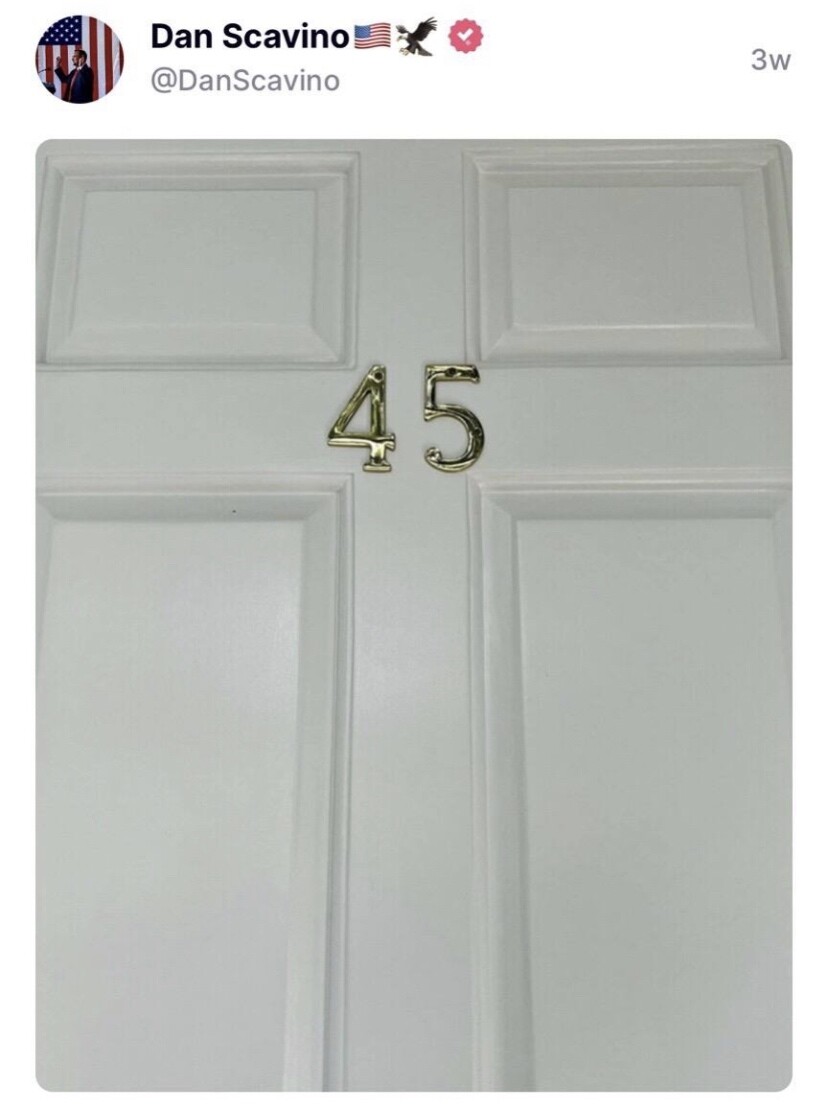
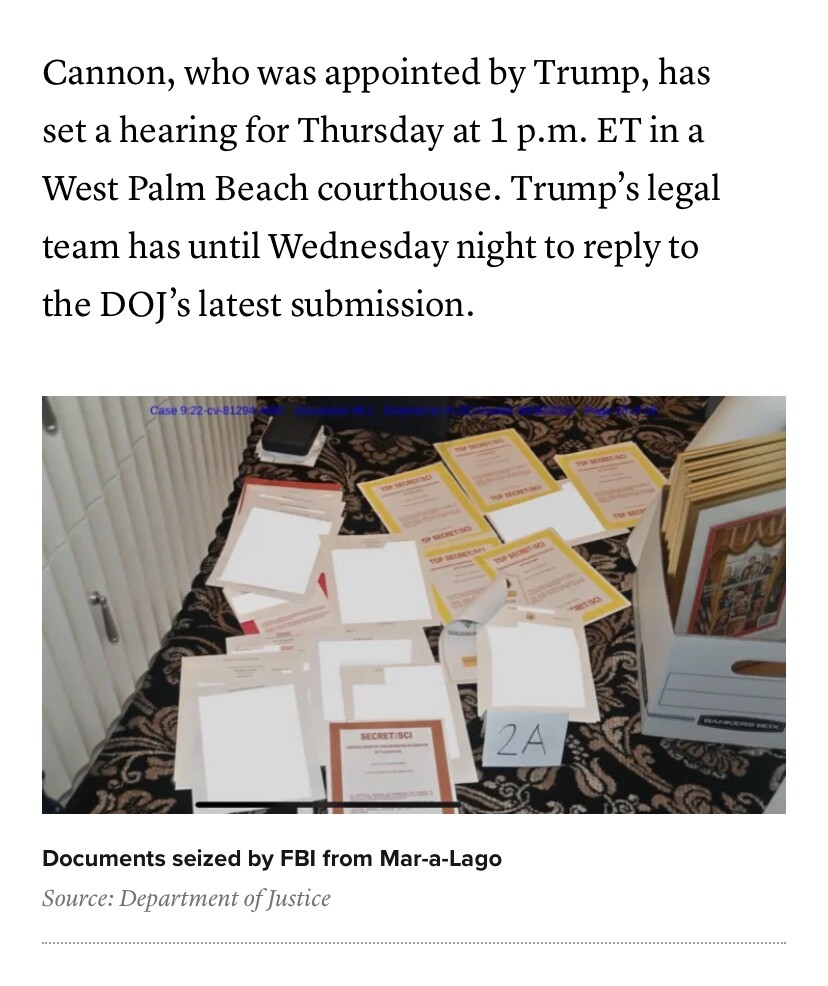

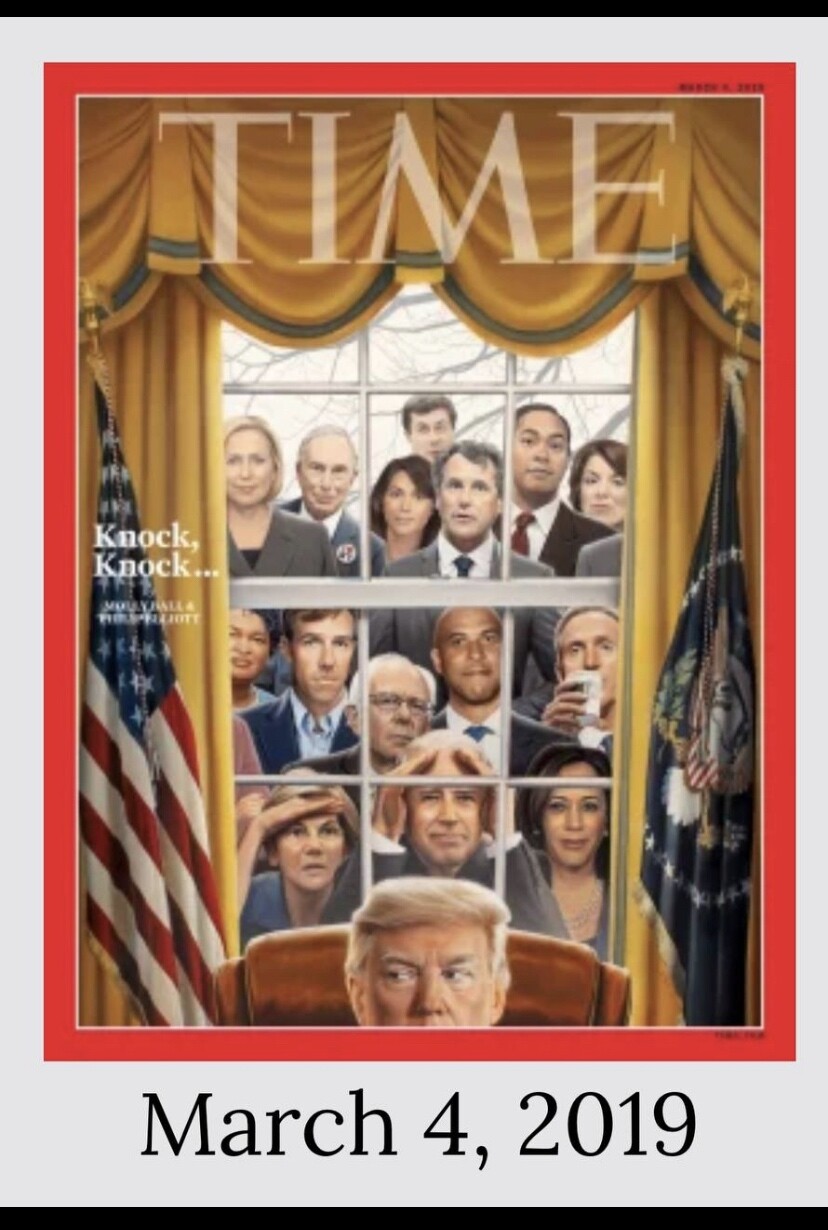
“Let them continue to keep making mistakes… Start fighting these in the court of law… Their own documents will EXPOSE their corruption.”
- The New York Post, once my favorite newspaper, in defense of Mitch McConnell’s weak performance in stopping the ridiculous, record-setting spending being done by Democrats (which will ruin our Country!) by not using “all of the tools in the tool box,” like Debt Ceiling, doesn’t discuss, in their recent Editorial, the advertisements run in Georgia by the Democrats “knocking” Mitch McConnell’s $600 limit, versus $2,000+ by the Radical Left Dems…
- ..McConnell lost those two Senate seats, not Donald Trump! If anything, The New York Post Editorial Board (whatever happened to them?) should be talking about the brand new revelation of the fired Trump hating “Special Agent” In Charge of the horrendous, and unnecessary, Mar-a-Lago Break-In—Also, this was the same horrible person who was in charge of the virtually non-existent 2020 Presidential Election investigation—but we found plenty, even without him!…
- …The fact is that the FBI told Facebook the “Laptop from Hell” was Russian disinformation when they knew very well that it was not. This Fake statement alone changed the outcome of the Election by millions of votes, and it was by no means the only corruption which took place. Sadly, the Media in our Country is so afraid of being sued that they never want to mention anything having to do with the corrupt Election of 2020!
- The Election was Irrefutably Compromised, Rigged, and Stolen! The “Laptop from Hell” is just additional proof. Our Country is going to hell! So now what?

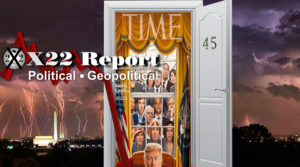
![Ep 2863a - Boomerang, Green New Deal Just Fell Apart, [CB]/[WEF] Failed](https://x22report.com/wp-content/uploads/2022/08/youtube_financial_ev-300x167.jpg)

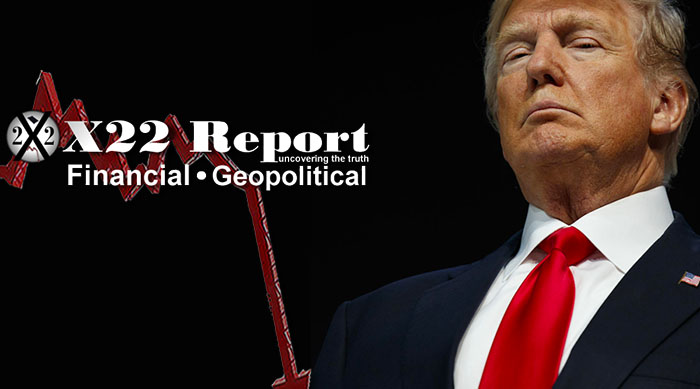
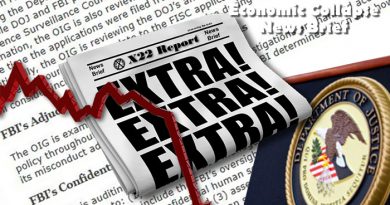
GOD BLESS THE TRUMP FAMILY ALWAYS 🦅 ☦️ 🇺🇸
Re the Irish coffee shop owner: The amazing part is how anyone can fail to see that the sanctions are at the root of all this; oh wait, there is a Ukie flag tag on the message. Yeah, stupid is as stupid does. Probably one of the Karens yelling at the unmasked/unvaxxed during the scam-demic.
And, all the while, Biden drains the Reserve to send (free) to China. Idiots everywhere.
Stupid old man Biden, the 2nd A says ‘keep and bear ARM’… necessary for militia purposes; right to own all kinds of weapons.
Re remark about the Taliban: As for AK’s, well, personally, I much prefer the .30 cal. (even better the .308) to the .22 cal., and the Russian is a more robust rifle, that underwent far fewer modifications during its service life… it deserves some respect.
Federal Election results of 2020 can only be retained for 22 months after the election (September 3rd). Can’t introduce them in court to decertify results if they are distroyed.
NOW WHAT??
You’re on it. My #1 source for ops of the moment. Q & Q+ are doing yeoman’s work that the world’s prosperity depends upon. X22 / Dave delivers the updates in a timely and concise manner – even when conjecture is necessary. Where else am I gonna go? I’ve looked at others and there’s just no comparison. Thanks for all that you do.
Hi Dave!
I want to thank you with ALL of my HEART for your amazing coverage over the past years.
You have been my daily news source for 4+ years, since I started following Q and I am extremely grateful.
I have shared your videos on facebook and in my Q facebook group—banned long ago…
and now share it in my Telegram group: Magic8Ball Redux along with other news from the US and around the globe.
When Trump is back in office, I pray he presents you with the Presidential Medal of Freedom!
-Lesley